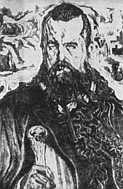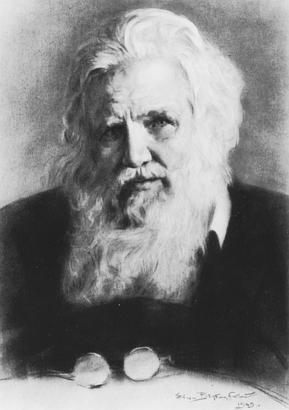Metropolitan Andrew Sheptytsky


Short biography from PRESS SERVICE OF THE PATRIARCHAL CURIA.
Thank you to Oleh Iwanusiw (iwanusiw@infoukes.com) for providing the photographs.

I remember when the Jewish visitor came to Roblin, Manitoba. And when he told me about a modern-day Moses. Ours, and his!
The year was 1959. The place was St. Vladimir's College, a minor seminary, run by the Redemptorist Fathers. I was in Grade 11. With 49 other students, I listened to this Jewish Ukrainian speak. He praised one of the greatest European prelates of this century, Metropolitan Andrei Sheptytsky, who headed the Ukrainian Catholic Church for nearly 50 years until his death on Nov. 1, 1944.
I had never heard of Sheptytsky before. I was just a farm kid from Grandview, Manitoba. And yet here was Kurt Lewin, a Holocaust survivor, a Haganah commander during the siege of Jerusalem, an Israeli Army officer, the great-grandson of Isaac Schmelkes -- a rabbi of Lviv still revered by orthodox Jewry as a spiritual and intellectual giant -- telling me about his Ukrainian saviour!
Lewin told us that we, as furture priests of the Ukrainian Catholic Church, should know what our Metropolitan had done for the Jews of Ukrainian Galacia under Nazi occupation. He spoke about how his own life was saved when the Metropolitan gave him shelter in Lviv's St. George's Cathedral, how the Metropolitan, who stood resolutely in favour of Ukrainie's independence and shared in the general euphoria of liberation from the Soviets, nevertheless kept a critical vigilance toward German rule.
In February 1942, he even dared to lodge a protest against the destruction of the Galacian Jewish community with Heinrich Himmler himself. The Nazi who delivered Himmler's response bluntly told the Metropolitan that if it were not for his age, he would have been shot for meddling in matters which should not concern him.
The Metropolitan saw things differently. He persisted with works of Christian charity. He soon mobilized a Christian opposition to Nazi rule in western Ukraine. He let the Vatican know what was happening, in late August 1942, when he wrote to Pope Pius XII, alerting the Holy Father to the "almost diabolical" nature of the German regime. A few days later he repeated that condemnation in a letter to Eugene Cardinal Tisserant, Prefect of the Congregation of Eastern Churches.
He also encouraged Christian resistance. Working with his brother, Klymentii, leader of Lviv's Studite monks, the Metropolitan gathered together a small army of nuns and priests who would risk their own lives in clandestine rescue and sanctuary operations. False baptismal certificates were arranged for no less than 200 Jewish children, who were then smuggled to monasteries, orphanages, and convent schools in and around Lviv. All of these children's lives were saved, 15 in the Metropolitan's own residence. This at a time when sheltering Jews was a criminal offense punishable by death.
Rabbi Dr. David Kahana also survived thanks to the Metropolitan's intervention. Later he drew up a list of over 240 Ukrainian Catholic priests who saved Jews. This good rabbi noted that his list was not exhaustive.
Thousands of Jewish Ukrainian lives were saved at the Metropolitan's command. And all remember how, in November 1942, Sheptytsky issued what was to become his best-known pastoral letter, "Thou Shalt Not Kill." His message on the sanctity of human life was a clear condemnation of genocide.
Attempts to have the Metropolitan proclaimed a saint have foundered on the protests of some Poles, on the propaganda of the Soviets and on the indifference or hostility of certain groups within the Jewish diaspora. In 1994, in his book A Journey Through Illusions, Lewin wrote about how he had tried to interest the American Jewish Congress and the Anti-Defamation League of Brith in "this extraordinary saga of assistance." That was in 1951! No one cared then. No one seems to be interested now.
As Lewin has observed, even Yad Vashem, dedicated to keeping alive the memory of the Holocaust, "seems to have difficulty in recognizing the man's compassion and assistance extended to the Jewish community in his diocese at the time of its martyrdom and destruction." To this day Sheptytsky is not honoured in Israel.
Of late there has been much debate about whether the Catholic Church did enough to save Jews during the Nazi terror. There can be not doubt that Sheptytsky did, acting as a leader of the Ukrainian Catholic Church, as a Ukrainian patriot, and as a man of rare intellect and spirituality. If he had been discovered, he would have been martyred, joining the many millions of other Ukrainian victims of the Holocaust.
This year marks the 50th anniversary of the State of Israel which on the 22nd of April will pay special honour to those who risked everything to save Jews. I shall pray that this will be the year in which Israel recognizes Metropolitan Andrei Sheptytsky as a Righteous Gentile, for many years ago, a Holocaust survivor told me that this man's deeds were truly holy.
Perhaps if Tel Aviv finally honours Sheptytsky as a Righteous Gentile, then one day soon, Rome will also confirm that Metropolitan Andrei was a saint - a Moses whom Itzhak and I can share.
Father Bohdan Lukie CSsR, a Redemptorist priest, is pastor of Holy Eucharist Ukrainian
Catholic Church in Toronto.
e-mail: bohdan_lukie@magic.com
Copyright © 1998 Father Bohdan Lukie